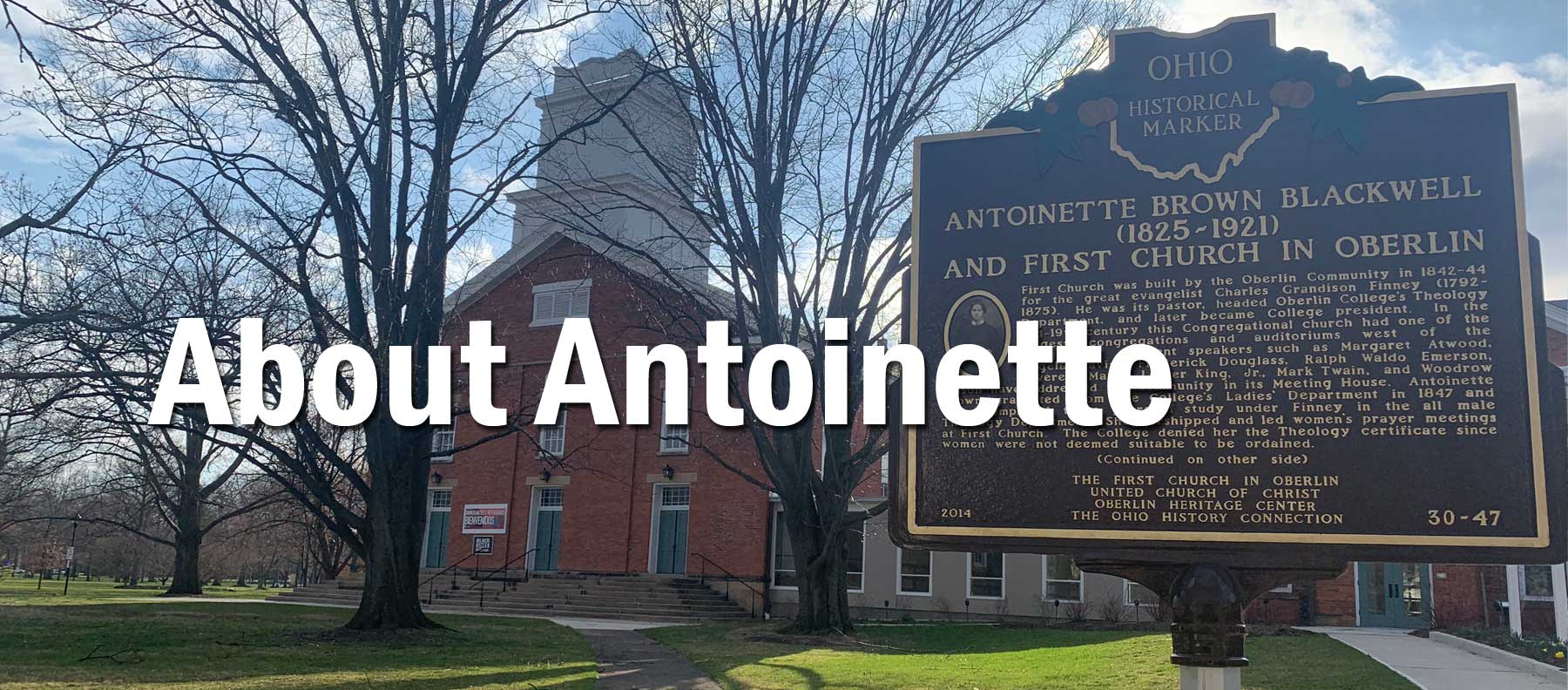Who Was Antoinette Brown Blackwell?
Born in Henrietta, New York, Antoinette Brown Blackwell was the first woman to be ordained as a minister in the United States. She was also a well-versed public speaker on the social reform issues of her time, and used her religious faith in her efforts to expand women’s rights. Always ahead of her time, she wrote prolifically on religion and science, constructing a theoretical foundation for sexual equality.
In 1993, Antoinette was inducted into the National Women’s Hall of Fame in Seneca Falls, New York
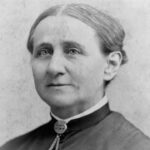
Antoinette Louisa Brown Blackwell (1825-1921) became one of the most outspoken and remarkable women of her era: an ordained minister, a leader in women’s rights and women’s suffrage, a published author, a prominent public speaker, and a philosophical thinker. Her life was punctuated by “firsts” that have significance within women’s history.
Early Years
Antoinette Brown was born in Henrietta, New York, on May 20, 1825, in a double log home in Henrietta, New York. When she was five, her father moved the family to a fieldstone house he built on the property. The house still exists today and has been restored under private ownership.
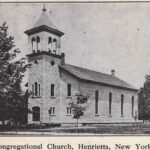 Antoinette’s memories were of a loving, happy family life on the farm. The seventh of ten children, she learned to read and write at an early age, which she preferred to traditional women’s chores such as cooking and sewing.
Antoinette’s memories were of a loving, happy family life on the farm. The seventh of ten children, she learned to read and write at an early age, which she preferred to traditional women’s chores such as cooking and sewing.
Brown’s parents were very religious and, while she was a child, they were inspired by many of the revivals sweeping through upstate New York at that time. Antoinette was influenced by her family’s religious beliefs from her earliest years, and at the young age of nine, became a full member in the Congregational Church in Henrietta (now known as the Henrietta United Church of Christ).
Education
Antoinette Brown attended Monroe Academy and later became a teacher there, where she earned the necessary money to enroll at Oberlin College in Ohio in 1846. Oberlin College was the first to grant bachelor’s degrees to women in a co-educational program.
 Antoinette completed the work in the Ladies Literary Course, and when she graduated, she asked to be admitted to the course in theology. During an evening walk, Brown told Lucy Stone, her future sister-in-law, about her plans to become a minister. As Brown Blackwell recalled the event, Stone said, “’You will never be allowed to do this. You will never be allowed to stand in a pulpit, nor to preach in a church, and certainly you can never be ordained.’” Brown Blackwell continued, “It was a long talk but we were no nearer to an agreement at the end than at the beginning. My final answer could only be, “I am going to do it.”
Antoinette completed the work in the Ladies Literary Course, and when she graduated, she asked to be admitted to the course in theology. During an evening walk, Brown told Lucy Stone, her future sister-in-law, about her plans to become a minister. As Brown Blackwell recalled the event, Stone said, “’You will never be allowed to do this. You will never be allowed to stand in a pulpit, nor to preach in a church, and certainly you can never be ordained.’” Brown Blackwell continued, “It was a long talk but we were no nearer to an agreement at the end than at the beginning. My final answer could only be, “I am going to do it.”
The faculty at Oberlin (as well as her family) were against this, but Brown was adamant and, finally, as a compromise, the faculty allowed her to attend lectures and to accept invitations to preach. However, after Antoinette completed the course, Oberlin refused to list her as a theology graduate and would not grant her a license to preach because she was a woman.
The injustice Antoinette suffered at Oberlin was somewhat corrected in 1879 when the college recognized her professional status by awarding her an honorary Master of Arts degree, and in 1908 when they bestowed on her an honorary Doctor of Divinity degree.
Ordained Minister, Social Reformer, Suffragist
After completing training at Oberlin, Antoinette Brown returned to Henrietta and earned an income by traveling the lecture circuit and speaking on topics such as women’s rights and temperance and by preaching whenever a church invited her. On the lecture circuit and in her writings, Antoinette addressed the need for social reform. In 1847 she delivered a speech on women’s rights at the Baptist church near Oberlin College, and in October of 1850, spoke at the first National Women’s Rights Convention in Worcester, Massachusetts.
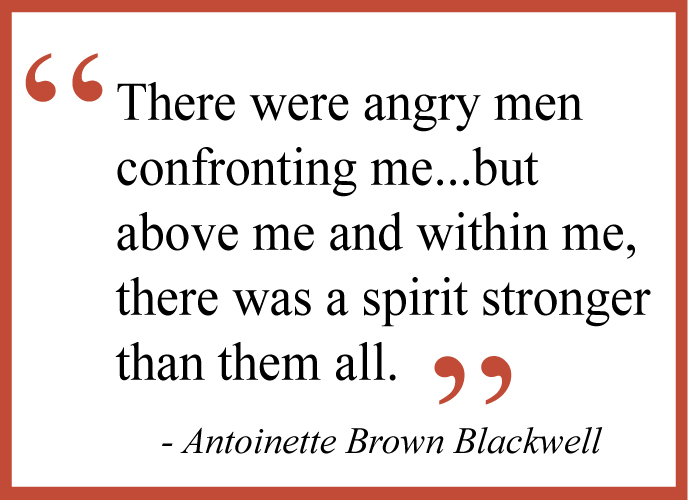 Antoinette was a legitimate delegate to the World’s Temperance Convention in New York City in 1853. There, because she was a woman, she was shouted down by a hostile audience when she attempted to speak, and ultimately expelled. This event became a watershed for women’s battle for a public voice. Brown also signed “The Just and Equal Rights of Women,” a call and resolutions for the Woman’s Rights State Convention held in Rochester, New York on November 30 and December 1 of the same year.
Antoinette was a legitimate delegate to the World’s Temperance Convention in New York City in 1853. There, because she was a woman, she was shouted down by a hostile audience when she attempted to speak, and ultimately expelled. This event became a watershed for women’s battle for a public voice. Brown also signed “The Just and Equal Rights of Women,” a call and resolutions for the Woman’s Rights State Convention held in Rochester, New York on November 30 and December 1 of the same year.
On September 15, 1853, the First Congregational Church in Butler and Savannah, New York (in Wayne County) ordained her as their pastor, thus making her the first woman minister of a recognized denomination in the United States.
In 1856 Antoinette married Samuel Blackwell, brother to Elizabeth Blackwell, who was the first female physician in the US. Together they raised five daughters. In addition to her duties as wife and mother, Antoinette remained active in the ministry all her life. She was a prolific writer of philosophical, social and religious treatises and an author of eight books. A tireless advocate for women’s rights, Antoinette Brown Blackwell was friends with suffragists Susan B. Anthony, Lucy Stone, and Elizabeth Cady Stanton. She was also active in the abolitionist cause, but always considered herself primarily a minister of God’s word.
The Right to Vote
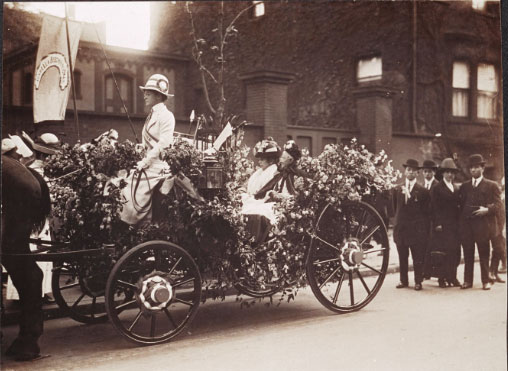 After the National American Women’s Suffrage Association Convention of 1906, Ms. Blackwell spoke at a hearing before the Senate Committee on Woman Suffrage in Washington, D.C. In 1908, the New Jersey Women’s Suffrage Association appointed her to write to President Theodore Roosevelt to urge him to support the federal suffrage amendment. At the state convention of 1911, all participants rose when she entered the room. The same year, she was given a place of honor in a Fifth Avenue suffrage parade in New York City. In the image at the right, she is pictured riding with Alice Stone Blackwell in a flower-festooned carriage during a suffrage parade. Image: Schlesinger Library
After the National American Women’s Suffrage Association Convention of 1906, Ms. Blackwell spoke at a hearing before the Senate Committee on Woman Suffrage in Washington, D.C. In 1908, the New Jersey Women’s Suffrage Association appointed her to write to President Theodore Roosevelt to urge him to support the federal suffrage amendment. At the state convention of 1911, all participants rose when she entered the room. The same year, she was given a place of honor in a Fifth Avenue suffrage parade in New York City. In the image at the right, she is pictured riding with Alice Stone Blackwell in a flower-festooned carriage during a suffrage parade. Image: Schlesinger Library
Antoinette Brown Blackwell was the last of the original leaders of women’s rights alive when the 19th Amendment was passed in 1920, and she voted at the age of 95. She died in 1921 in Elizabeth, New Jersey, and was inducted into the National Women’s Hall of Fame on October 9, 1993.

